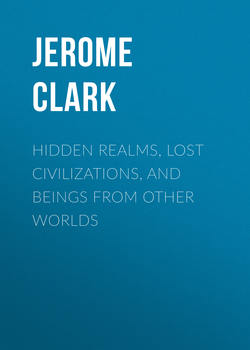Читать книгу Hidden Realms, Lost Civilizations, and Beings from Other Worlds - Jerome Clark - Страница 31
На сайте Литреса книга снята с продажи.
Brodie’s Deros
ОглавлениеNot all dero-related stories are of an origin as uncertain as the alleged Fields’. John J. Robinson undeniably existed, a figure on the East Coast UFO scene and an associate of New Jersey-based Saucer News publisher/editor James W. Moseley. Robinson had no reputation as a spinner of yarns, which makes his story no less hard to credit. It rests solely on his testimony. If we take him at his word, one possible explanation for the strange narrative is that he was the credulous victim of an elaborate prank.
In the mid–1940s, so the account goes, Robinson lived on the third floor of a house in Jersey City. A reclusive artist named Steve Brodie occupied the second floor. Eventually, Robinson befriended Brodie, who nonetheless continued to behave eccentrically. He had a pronounced disdain for meat, and he seemed to live in fear that, as Robinson put it, “someone might be attempting to sneak up behind him.” He did two kinds of paintings: some depicting conventional scenes, the others capturing eerie, otherworldly visions. As he painted the latter, Robinson observed, he appeared to enter a trance state.
On glimpsing an Amazing Stories issue in Robinson’s pocket, Brodie looked startled. Robinson proceeded to detail Shaver’s claims, to Brodie’s visibly mounting unease. “He writes of the dero!” he exclaimed with obvious disapproval. With much coaxing and a promise that he would not be ridiculed, Brodie spoke of a terrifying experience he had undergone seven years earlier.
He and a friend had gone out west to prospect for semiprecious stones. Locals warned them to stay away from a particular desert mesa; several individuals had vanished there, they said. Naturally, the young men laughed off these words of caution. Just as predictably, they would pay the consequences.
A few days into the expedition, hearing a cry from his companion, Brodie took startled notice of a cowled figure standing at the base of the mesa. Soon another appeared beside it. The first produced a rod-shaped device which it directed toward Brodie, who abruptly felt himself paralyzed. As Brodie’s friend took to his heels, the second figure aimed its own device at him. The next thing he knew, Brodie’s nostrils were thick with the sickening scent of burning flesh. That was the last he ever saw of his friend.
A third figure approached Brodie, then placed something just below his ears, rendering him unconscious. “At this point in his narrative,” Robinson said, “Steve showed me why he wore his hair long at the back of his head. Behind each ear at the base of the parietal bones of his skull were bare, seared, scarred patches of skin upon which no hair could grow. Both of these areas behind the ears were a little smaller than the size of a silver dollar and were perfectly circular. Steve said they were the marks of a dero slave.”
Of what followed from the initial encounter, Brodie had only nightmarish intermittent memories, flashes of recall in which he saw himself sharing a cave with other human beings. They were inside a cave, imprisoned by the deros who could kidnap any surface dweller they had a mind to take. As soon as one of his captors noticed that Brodie was conscious, he would be zapped into blackness.
Then one day he woke to find himself walking the streets of New York City with no idea how he got there. He had on his prospecting clothes and a hundred dollars in his pockets just as he had on the day his life changed. That day, he soon learned, had been two years before.
Brodie added that the scent of meat had nauseated him ever since. For his part, Robinson saw no evidence that Brodie read much of anything, least of all Shaver material out of which he could have concocted this implausible tale.
Soon afterwards, Robinson moved from the apartment, losing contact for a time with the people there. On a return visit six months later, he learned that Brodie was no longer there. A mutual acquaintance claimed that he had spotted Brodie on a train passing through Arizona. Brodie, who appeared to be in a “stupor” (though he was not a drinking man), did not respond to a greeting. He disappeared after the train stopped at a small town. Robinson inferred from this anecdote that Brodie was back in the deros’ clutches.
